
Your teen has decided to move to a plant-based diet, but you aren’t sure whether this is a great idea, or what you can do to support them. Read on to learn about some of the reasons for choosing a plant-based diet, and what you can do to support them if it is the right choice for them.
CHECK IN WITH THEIR REASONS
There are many reasons why your teen may be considering a plant-based diet. Checking in with their reasons can help you better understand the motivation behind their choice.
Some of the reasons for choosing to go vegetarian or vegan can include:
Ethical
There is increasing concern within the community about how animals are treated when they are used for food production. As demand for food increases with increasing populations, production of meat and dairy products has moved to a mass production scale. With this, some questionable practices have arisen in animal husbandry that many people consider unethical, such as battery or factory farming, feedlots, or slaughtering practices to name a few.
Some practices are common in Australia, while others are not permitted, or not commonly used. Spending time researching whether these occur in Australia may help to alleviate their concern over ethical practices or help you to build an understanding of their concerns about the ethics of meat and dairy production.
Environmental
With increasing concern about human impacts on the environment, focus has shifted to the environmental impact of food production in general. The raising of some animals can be resource intensive in some areas,1,2 and beef and lamb are known for high methane emissions, a greenhouse gas that contributes to climate change.3
Taste preferences
For those who don’t enjoy the taste of meat, opting to be vegetarian can be a simple way of excluding this food from their diet. Putting a label on this such as ‘vegetarian’ is helpful for eating out, going to events, or having others cook for you, as it is a simple way of excluding disliked foods.
Health
There is evidence that plant-based diets are associated with improved health outcomes. A 2021 review of plant-based diets found a decreased risk of cardiovascular diseases, type 2 diabetes, and some cancers.2
Concerns about body weight, shape, or appearance
There is increasing pressure on people of all genders to conform to certain ideal body types.
For example, this can come from influencers on social media or persistent messaging in the media about the impacts of a higher body weight on health. This pressure may also be subtle, such as overheard commentary from friends or family on the size or shape of their own or others’ bodies.
Internalisation of these messages can lead young (and older) people to restrictive dieting practices that aren’t always associated with good health. Vegan and vegetarian diets exclude higher energy foods and are a simple and socially acceptable way of reducing overall energy intake.4 If a diet is motivated by weight and body image concerns, there is a risk that it can lead to disordered eating that can have negative effects on both physical and mental health.2, 5
SO HOW CAN I SUPPORT THEM?
Nutritional balance
Check to see if they know what is needed to meet their nutritional requirements. Do they understand the requirements of a plant-based diet and what nutrients they will need to consider? Will they just exclude meat and dairy, or have they considered what foods they need to eat more of?
When preparing meals and talking to them about nutrition, focus on nutrients that are found in lower amounts in vegetarian and vegan diets. These can include protein, iron, calcium, fatty acids, iodine, B12, and zinc.2,6 If you are unsure, you can chat to a dietitian about foods that are rich in these nutrients and get advice for how to include them in the family’s diet.
It is important to ensure an alternative source of protein is offered at meals, rather than just leaving out the meat. A low protein meal can be unsatisfying and unappealing, and this may increase the risk of your teen not meeting their nutritional requirements.
Learn about plant-based cooking
Try having a meat free night for the whole family. There are many benefits to a shared family meal including social and emotional development and mental health.7 The whole family will also reap the health benefits of plant-based eating, even if only a few nights a week.
Try out some new recipes and foods. There are many fantastic cookbooks for vegan and vegetarian diets and some great websites with recipes and tips. If you want to try out cookbooks but don’t want to buy them, you can borrow them from the local library, and copy your favourite recipes before returning them.
Consider spending time preparing a vegetarian/vegan meal with your teen. They will benefit from learning new cooking skills as they get older, and this can be a great way to spend time together.
Consider other factors outside the home
Be familiar with label reading when buying new products. For example, some foods contain additives that are derived from animals such as rennet in cheese or gelatin in some bakery foods and marshmallows.
If eating out with the family, check out menus for restaurants before you go to make sure they have a good selection of vegetarian foods. Some restaurants include plenty of vegetarian options while others will only have one or two. This will ensure they feel included and have a great evening out with family.
Check in with a dietitian
Find a dietitian with a special interest in plant-based eating and chat to them about how to include nutritious plant-based foods in the family meals. Dietitians can help with identifying gaps in nutritional intake and provide practical advice for meeting nutritional requirements. If you are concerned about your teen’s reasons for choosing a plant-based diet, a dietitian can assess their risk of disordered eating and provide appropriate advice and support.
If you and/or your teenager would like support navigating through plant-based diets, book in with Sian today!
References
- Wiedemann Stephen, McGahan Eugene, Murphy Caoilinn, Yan Mingjia (2016) Resource use and environmental impacts from beef production in eastern Australia investigated using life cycle assessment. Animal Production Science 56, 882-894.
- Craig WJ, Mangels AR, Fresán U, et al. The Safe and Effective Use of Plant-Based Diets with Guidelines for Health Professionals. Nutrients. 2021;13(11):4144. Published 2021 Nov 19. doi:10.3390/nu13114144
- González N, Marquès M, Nadal M, Domingo JL. Meat consumption: Which are the current global risks? A review of recent (2010-2020) evidences [published correction appears in Food Res Int. 2020 Nov;137:109620]. Food Res Int. 2020;137:109341. doi:10.1016/j.foodres.2020.109341
- Sergentanis TN, Chelmi ME, Liampas A, et al. Vegetarian Diets and Eating Disorders in Adolescents and Young Adults: A Systematic Review. Children (Basel). 2020;8(1):12. Published 2020 Dec 28. doi:10.3390/children8010012
- Memon AN, Gowda AS, Rallabhandi B, et al. Have Our Attempts to Curb Obesity Done More Harm Than Good?. Cureus. 2020;12(9):e10275. Published 2020 Sep 6. doi:10.7759/cureus.10275
- Craig WJ, Mangels AR; American Dietetic Association. Position of the American Dietetic Association: vegetarian diets. J Am Diet Assoc. 2009 Jul;109(7):1266-82. doi: 10.1016/j.jada.2009.05.027. PMID: 19562864.
- Harrison ME, Norris ML, Obeid N, Fu M, Weinstangel H, Sampson M. Systematic review of the effects of family meal frequency on psychosocial outcomes in youth. Can Fam Physician. 2015;61(2):e96-e106.



